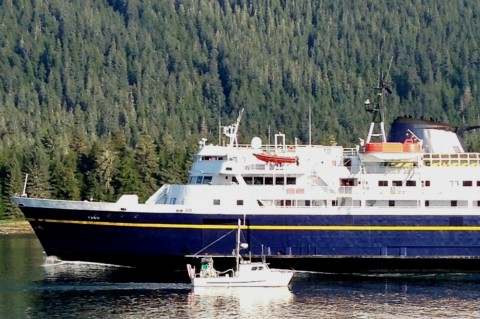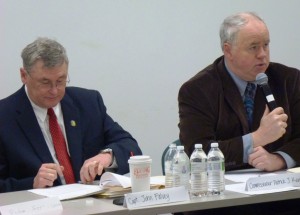
The ferry Taku sails into the Wrangell Narrows on its way south in 2013. It’s part of an aging fleet needing repair or replacement. (Ed Schoenfeld/CoastAlaska News)
Could the firing of three top state transportation officials put the Alaska Marine Highway at risk? That’s what some ferry supporters are asking. But state officials say there’s not much to worry about.
When Gov. Bill Walker removed Department of Transportation Commissioner Pat Kemp, he also got rid of two other top officials.
One was Al Clough, director of the region including Southeast and coastal Southcentral Alaska. The other was Reuben Yost, the deputy commissioner whose duties included overseeing the Alaska Marine Highway System.
“I think to take those three extremely experienced transportation people out of our DOT system is not good,” says Cathie Roemmich, a member of the state’s Marine Transportation Advisory Board and a former director of the Juneau Chamber of Commerce.
Speaking as an individual, not for either group, she says Walker’s move could hurt the region’s economy. That includes the ferry system as well as the Juneau Access Road, which the governor put on hold.
“I think transportation infrastructure (and) our ferry system … are crucial to Southeast Alaska. And if everything comes to a standstill, it’ll be devastating,” she says.

Ferry system General Manager John Falvey, left, attends a meeting with then-Transportation Commissioner Pat Kemp on Jan. 22, 2013. (Ed Schoenfeld/CoastAlaska News)
Kemp, Yost and Clough were told to resign because of a memo the governor saw as challenging his decision to freeze the Juneau road and some other transportation projects. Kemp says it was just an informational update.
Walker then named Transportation Department Deputy Commissioner John Binder to head the agency on an interim basis.
Binder says the marine highway’s longtime general manager is taking on some additional responsibilities.
“Currently, Capt. John Falvey has stepped in and is handling the matters associated with the ferry system,” he says.
One of the deputy commissioner’s jobs is to advocate for marine highways during legislative hearings, including those involving its budget.
Binder says he understands that’s important.
“Certainly our desire will be to find somebody appropriate for a leadership position on the ferry side. But that’s still all in the works,” he says.
Binder’s focus as a deputy commission is aviation, though he worked on other projects. The third deputy commissioner, Kim Rice, is mostly focused on highways.
Binder says the administration tasked him with beginning the process of finding a new ferry-focused deputy commissioner.
“They did ask that we gather some names and provide them some recommendations on who would be appropriate for those positions. And certainly in this time of fiscal challenge, we’re going to make sure we do everything we need to make sure every transportation mode is effectively represented. And that’s the process we’re currently undergoing,” he says.
Gov. Walker has said the commissioner’s job will be filled soon.
Meanwhile, some ferry supporters are happy with the management change. One is Skagway’s Mike Korsmo, who used to chair the Marine Transportation Advisory Board.
“My dealings with the former commissioner and deputy commissioner, they were so focused on Juneau Access to the point where I think they neglected the inroads made in the ferry system several years before,” he says.
Korsmo notes the past administration changed deputy commissioners and altered plans for two new Alaska Class Ferries without consulting the board.
“I would hope the current administration goes back to using the Marine Transportation Advisory Board the way it was … intended to be set up. And that they do ask for input, at least, from MTAB as to who is to be in that position,” he says.
Six of the 12 board members represent different regions served by the marine highway system. Others include a travel agent, a marine engineer, a union official and someone who does not live in a ferry community.





